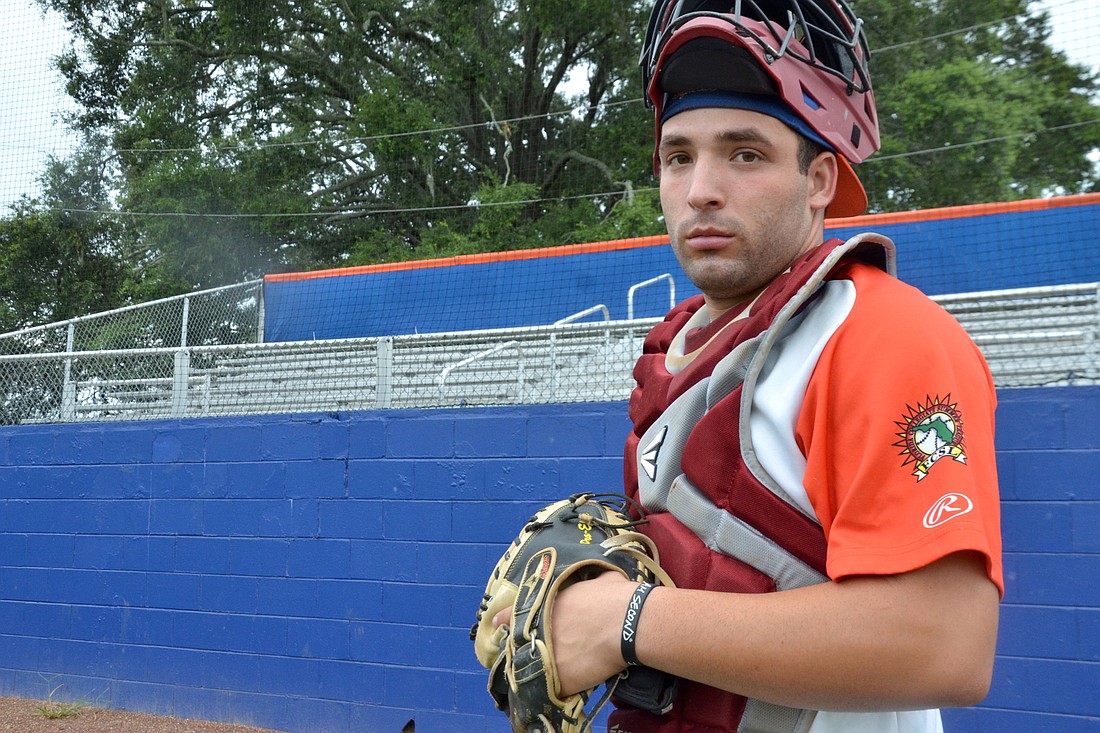- April 22, 2024
-
-
Loading

Loading

WINTER GARDEN The external microphone of the cochlear implant installed behind Chase Smartt’s right ear is the only outward indicator that he is deaf.
Should anyone notice it — a curious child, perhaps — Smartt has no problem answering questions about his impairment. In fact, he embraces and even enjoys discussing it, as well as the device that enables him to hear.
Being born with 98% hearing loss hasn’t stopped Smartt — a rising junior for the Troy University baseball team and current catcher for the Winter Garden Squeeze — from playing the game he loves.
It also hasn’t stopped him from being named Alabama’s Class 5A Player of the Year in 2015. Or from being drafted in the 35th Round of Major League Baseball’s First-Year Player Draft by the Atlanta Braves later that year. Or from ultimately signing a National Letter of Intent and enrolling at Troy University, where he now plays for his father, Troy head coach Mark Smartt.
Most recently, he’s made himself known for the Squeeze in the Florida Collegiate Summer League, hitting .297 with six doubles and a home run — enough to earn him a spot in the FCSL All-Star Game earlier this month.
All the while, he’s made a strong impression on Squeeze manager Jay Welsh and his teammates.
“Best (work ethic) on the team — first guy here, last guy to leave,” Welsh said. “The kids, his teammates, they just absolutely love him. … He’s just a special kid.”
Smartt was born profoundly deaf, as doctors term it, leaving his parents with two options while he was just a baby — accept that he would never hear or to try to surgically remedy the impairment via surgery and the cochlear implant.
To this day, Smartt is glad his parents rolled the dice and approved the surgery. He has had to learn to hear in a way most people could never appreciate, and there are still struggles — especially with relation to a sound’s direction — but he hears well enough to compete as a Division I athlete.
“To learn to hear is very difficult — you have to learn sounds from the ground up,” Smartt said, describing the process as tedious. “It’s gotten better, but it’s still hard when I play.”
Smartt does not feel sorry for himself, though. He has an impressive work ethic, something he says comes from having a dad who is a college baseball coach but also from observing his older sister, Taylor Smartt, who played softball at Troy.
Smartt works hard, but his unique perspective means he tries to enjoy each day that he comes to the ballpark.
“I feel grateful every day. I’m pleased and blessed to play at this high level.”
— Chase Smartt
“Baseball is a fun game to play,” Smartt said. “That’s what I’m trying to bring (to the team).”
During games, Smartt’s impairment is largely hard to notice. If he is catching and a coach is having trouble getting his attention, the pitcher may need to step off the mound. In big games with large crowds, his limited hearing with the implant means he also has a limited feel for the energy emanating from the stands.
Nevertheless, he started 54 games as a freshman at Troy and, as a sophomore, showcased improvement in tallying 14 extra-base hits — including four home runs — and 24 RBIs. He is considered one of the better catchers in college baseball.
“His swing is so pure,” Welsh said. “The ball just screams off his bat.”
The more Smartt’s reputation and story spread, the more parents of other children with hearing impairments are inclined to reach out — as the family of a young boy from Kentucky did recently.
Whatever the case, Smartt said he enjoys the opportunity to be a role model, to discuss ways to cope and to inspire.
“I feel grateful every day,” Smartt said. “I’m pleased and blessed to play at this high level.”
Contact Steven Ryzewski at [email protected].